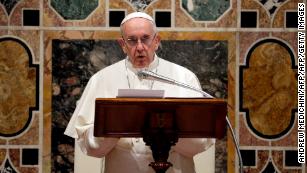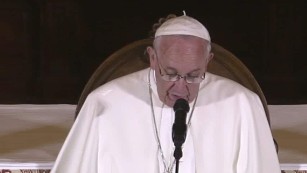(CNN)Pope Francis’ trip to South America this week is supposed to be all about peace, unity and hope. But the pontiff could also be welcomed with protests, threats of violence and controversy over allegations of abuses by the Catholic Church.
Francis, a native of Argentina, comes to his home continent for a two-country, six-city apostolic visit that starts in Chile Monday and ends in Peru a week later.
According to Vatican officials, some of his themes on the trip will include the environment and the plight of indigenous peoples. In Pope Francis tradition, he will be meeting with his Jesuit brothers and Catholic bishops, but also the poor, the vulnerable, youth groups and indigenous communities.
Vandalism in Chile
Already there has been recent violence in Santiago, Chile’s capital, where at least five churches were recently attacked — some with firebombs — according to the country’s Interior sub secretary, Mahmud Aleuy. The vandals left behind a menacing message.
“Pope Francis, the next bombs will be on your cassock,” read one of the messages, according to local newspapers.
The attacks on the churches started Friday, leaving some with burned doors and charred and busted windows. No one was hurt, according to local reports.
Aleuy denounced the violence in a press release, saying, “everyone has a right of expression so long as it’s peaceful and not violent.” One of the churches attacked is near the Apostolic Nunciature, the Vatican embassy where the pontiff will stay while in Chile.
In the wake of the attacks the security plan for the Pope’s visit is being re-evaluated and reinforced, Aleuy said. No one has been arrested in connection with the church attacks.
Protests over the Catholic church’s clerical sex scandal also are expected. Residents of the southern city of Osorno vehemently object to Francis’ decision to appoint Juan Barros in 2015 as bishop of the diocese there and have said they plan to protest his arrival in Santiago.
Survivors accuse Barros of covering up for Fr. Fernando Karadima, who was found guilty by the Vatican of child sex abuse. According to Crux, a Catholic news outlet, Karadima was convicted of pedophilia and abuse of his position in 2011 and was sentenced to a life of penitence and prayer.
Barros has denied any knowledge of the abuse.
An abuse case in Peru
More protests may come in Peru, where the Vatican recently took control of an apostolic society, Sodalitium Christianae Vitae (SCV), after allegations that its members abused youth sexually, physically and psychologically. A report issued by SCV in February of last year detailed the alleged abuse, which dates back to the 1970s, and found the allegations had merit.
A Vatican press release said Francis was following the investigation for several years and insisted that the church give attention to the matter. A separate criminal investigation is being conducted by authorities in Peru.
Families of the victims have told local newspapers that they would like to speak with the Pope. When asked if Francis will meet with abuse victims, a Vatican official said it was not in the program, and Francis could face protests over the church’s handling of this case.
These tensions are also evident on social media, where people in both countries have expressed both excitement and discontent with Francis’ visit.
Pope Francis is well aware of the challenges that await him in Chile and Peru. He spent a year and a half in Chile and has traveled to Peru multiple times, according to Vatican officials. And in his video message to both countries, recorded ahead of his visit, he specifically mentioned his knowledge of their difficult histories and his hope to share their pains and joys during his visit.
” I want to share your joys, sorrows, difficulties and hopes,” he said. “I want to tell you that you’re not alone, that the Pope is with you.”
*News Searching By CNN*


























